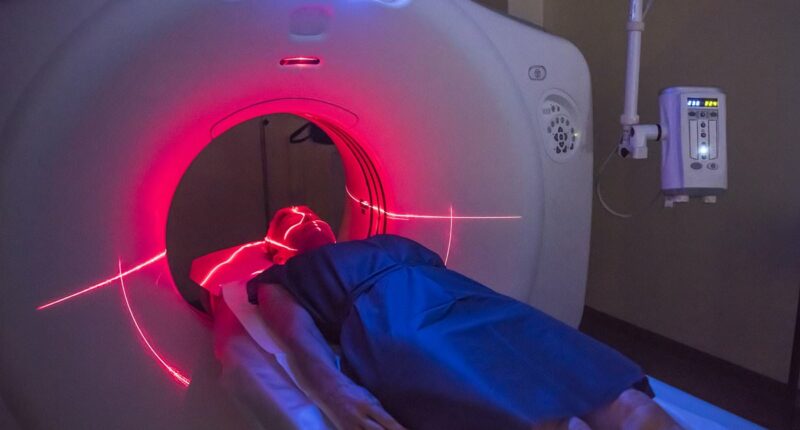Share this @internewscast.com
Revolutionary weight loss injections trusted by millions of dieters and diabetics might hinder the effectiveness of certain cancer scans, according to experts.
Medications like Mounjaro and Wegovy have pioneered a new chapter in combating obesity, enabling individuals to lose up to a fifth of their body weight.
Nevertheless, British scientists evaluating PET-CT scans—which are instrumental in diagnosing and staging cancers—found that these injections negatively influenced how tissue appeared, potentially leading to false cancer warnings.
This resulted in patients on these injections—known as glucagon-like peptide-1 receptor agonists, or GLP-1s—being more likely to undergo needless additional testing to examine healthy tissues.
Experts fear it could cause stress and uncertainty for patients and even cause delays in other treatments.
It also comes just months after concerning research also suggested GLP-1 drugs could potentially interfere with breast cancer chemotherapy drugs.
Dr. Peter Strouhal, medical director at Alliance Medical, a top diagnostic imaging service provider in the UK, and lead author of the study, stated: “We observed an unusual uptake in one of our patients using a GLP-1 agonist, prompting a broad review throughout our network.”
“We discovered these altered patterns are more frequent, yet at present, there is no national or international directive in the UK addressing this new issue,” he added.

British researchers who assessed PET-CT scans—which help diagnose and stage cancers—discovered the injections detrimentally affected how tissue appeared on scans, which could be misinterpreted as potentially cancerous
In the study, researchers undertook a review of several PET-CT scans of patients who were taking the drugs, after uncovering the anomaly with one patient.
A PET-CT scan combines a CT scan and a PET scan. It uses a mildly radioactive liquid, known medically as a radioactive tracer, to show areas of your body where cells are more active than normal.
A higher level of metabolic activity — and concentration of tracer on the scan — could signal potentially cancerous activity which appears as brighter spots.
The researchers found ‘several’ patterns of tracer on the scans among GLP-1 users that were ‘atypical’ and ‘could be misinterpreted’ as hot spots, or potentially cancerous areas.
Hot spot areas, with high levels of tracer, do not always signal cancer and could be a sign of other conditions such as infections or inflammation.
Dr Strouhal said: ‘Recognising the characteristic uptake associated with GLP-1 agonists helps avoid unnecessary anxiety and interventions, ensuring patients receive the right care, at the right time, without detours or doubt.’
However, further research involving more data is vital to prove this is the case, researchers said, before recommendations are made to alter PET-CT scan guidelines for all weight loss jab users.
Instead, medical teams should carefully consider a patient’s medical history when interpreting scan results, they added.
The research will be presented in full on October 8 at the Annual Congress of the European Association of Nuclear Medicine in Barcelona.
It comes as research late last year found GLP-1 drugs could potentially interfere with breast cancer chemotherapy drugs.
In the US study, hundreds of women with early-stage triple negative breast cancer were followed throughout and after treatment.
A few dozen (25) were already taking GLP-1s alongside other diabetes drugs and continued to do so while having cancer treatment.
Tests two years later showed just 28 per cent of the women on GLP-1s responded fully to the cancer therapies, and were clear of cancer.
More than twice as many — 63 per cent — of those not on GLP-1s were cancer free.
The researchers also discovered GLP-1s had infiltrated tumour cells and immune cells in samples taken from the patients.
Dr Bethania Santos, an oncologist and researcher at UT Southwestern Medical Center in Dallas, who presented the study at San Antonio Breast Cancer Symposium, said: ‘Use of GLP-1 use may need to be carefully considered during breast cancer therapy.’
However, experts at the time suggested the weight loss drugs themselves may not have decreased the effectiveness of chemotherapy.
Rather, people who have advanced diabetes requiring multiple medications are at increased risk for breast cancer recurrence.
The study, they said, did not prove whether weight loss drugs help or hurt the effectiveness of cancer therapy.











